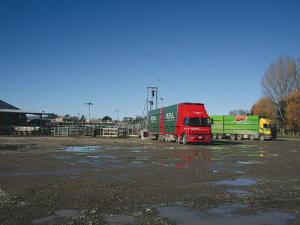NZ Catchment Groups Thrive with ‘Source to Sea’ Approach
The most successful catchment groups in NZ are those that have 'a source to sea' approach.
 Taranaki Regional Council will reach out to transport, rail, agricultural machinery, nurseries, forestry and roading contractors.
Taranaki Regional Council will reach out to transport, rail, agricultural machinery, nurseries, forestry and roading contractors.
Taranaki Regional Council and the Ministry for Primary Industries (MPI) have joined forces to identify the pathways by which new pest plants could enter the region, whether by road, rail, coast or air.
The Council will then work alongside the sectors most at risk of inadvertently transporting pests in and out of Taranaki.
The project, currently in its early stages, also aims to raise public awareness and encourage locals to be vigilant.
Environment services manager Steve Ellis says strong biosecurity is of fundamental importance to Taranaki’s environment, economy and health.
Not only do pest plants and animals threaten native ecosystems, they are a risk to agriculture and production. Aquatic pest plants such as hornwort can also interfere with the recreational use of lakes and other waterways.
Ellis says pest control is an ongoing challenge and the last thing Taranaki needs is a new biosecurity threat to contend with.
“We will soon start reaching out to port users, iwi, community groups and higher risk industry groups such as transport, rail, agricultural machinery, nurseries, forestry and roading contractors,” he says.
Ellis says these groups often travel into the region from other regions who may be battling pest species not yet present in Taranaki.
“Pests can be imported as seeds in dirty machinery, in soil, as eggs on contaminated goods or as live pests just hiding out in freighted goods.”
“We’ll be offering any support they need, and just ensuring biosecurity remains front of mind as they go about their business.”
The Council works closely with neighbouring regional councils on biosecurity issues.
Ellis says if a new pest does make its way into the region, the important thing is to identify it quickly and stamp it out before it has the chance to spread.
“We need lots of eyes so will be asking the public to keep their eyes out and use the free Find-a-Pest app to identify anything suspicious.”
The Council is on alert for a number of new pest plants including alligator weed, which has taken hold in both the Waikato and Horizons regions.
“It’s right there at our borders and we desperately want to keep it out. It clogs up waterways and is causing major headaches and cost for those regions,” Ellis says.
Other threats include the coastal plant sea spurge, a significant environmental and public health concern. It is not known to have established in Taranaki but is edging closer from both the north and south. Plague skinks are common stowaways with population pockets in Taranaki, while Chilean needle grass and Darwin ants would be problematic should they turn up.
Global trade has been thrown into another bout of uncertainty following the overnight ruling by US Supreme Court, striking down President Donald Trump's decision to impose additional tariffs on trading partners.
Controls on the movement of fruit and vegetables in the Auckland suburb of Mt Roskill have been lifted.
Fonterra farmer shareholders and unit holders are in line for another payment in April.
Farmers are being encouraged to take a closer look at the refrigerants running inside their on-farm systems, as international and domestic pressure continues to build on high global warming potential (GWP) 400-series refrigerants.
As expected, Fonterra has lifted its 2025-26 forecast farmgate milk price mid-point to $9.50/kgMS.
Bovonic says a return on investment study has found its automated mastitis detection technology, QuadSense, is delivering financial, labour, and animal-health benefits on New Zealand dairy farms worth an estimated $29,547 per season.

OPINION: Here w go: the election date is set for November 7 and the politicians are out of the gate…
OPINION: ECan data was released a few days ago showing Canterbury farmers have made “giant strides on environmental performance”.